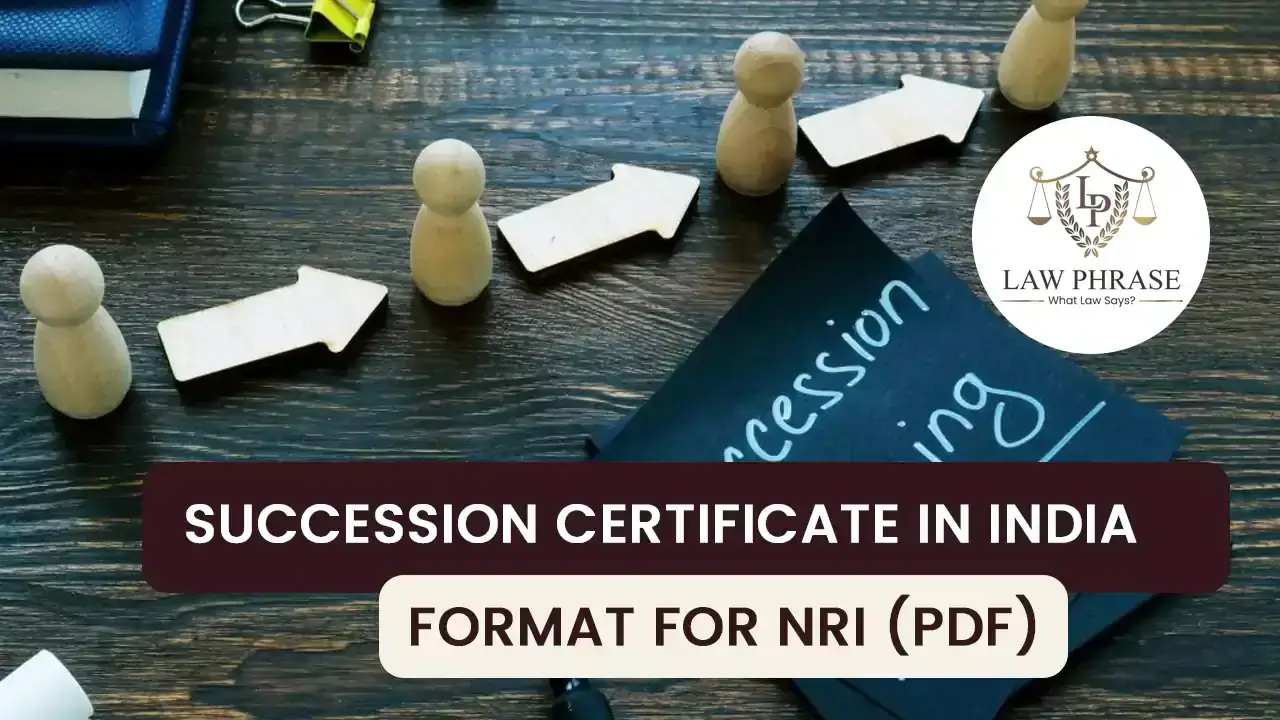Succession Certificate In India For NRI (PDF)
 Law Phrase 05-02-2024
Law Phrase 05-02-2024

Table Of Contents:
- What is a Succession Certificate?
- What is the Requirement of a Succession Certificate in India for NRI?
- What is the difference between a Succession Certificate and a Legal Heir Certificate?
- How to apply succession certificate in India for NRI?
- Succession Certificate Format For NRI PDF:
- Documents Required for Succession Certificate in India for NRI:
- What are the common challenges faced by NRIs in obtaining a succession certificate in India?
- Conclusion:
When Non-Resident Indians (NRIs) deal with inheritance matters in India without a will, things can get complicated. That's where a Succession Certificate in India for NRI comes in handy. It's a legal document that gives NRIs the power to smoothly handle and claim the assets of a deceased relative in India. This certificate is especially important for accessing bank accounts, managing investments, and transferring property titles.
The Succession Certificate in India for NRI makes the process of transferring assets easier and provides legal protection against disagreements. It's like a crucial tool for NRIs facing inheritance issues, helping them navigate the Indian legal system more easily. So, NRIs should make sure to get this certificate to make the whole process of managing and inheriting assets in India simpler.
What is a Succession Certificate?
A succession certificate in India for NRI is a legal document issued by a competent court in India. It is particularly important in cases where someone has passed away, and it grants authority to individuals, especially Non-Resident Indians (NRIs), to manage and claim the assets of the deceased person. This certificate becomes crucial when there is no valid will left by the deceased. Essentially, it serves as official permission from the court for the rightful individuals to handle the inheritance matters and assets of the deceased person.
What is the Requirement of a Succession Certificate in India for NRI?
The requirements for a succession certificate in India for NRI are generally similar to those for residents, but there may be additional considerations due to the overseas status of the NRI. Here are some general requirements:
-
Death Certificate: A copy of the death certificate of the deceased person is usually required to initiate the process. This document is essential for establishing the fact of death.
-
Proof of Relationship: Documents establishing the relationship between the deceased and the person seeking the succession certificate are required. This may include birth certificates, marriage certificates, or other relevant documents.
-
Proof of Residence: NRIs may be required to provide proof of their overseas residence, such as a copy of their passport, visa, or any other relevant document.
-
Details of Assets: Information about the assets and liabilities of the deceased person is typically required. This may include details of bank accounts, investments, properties, and other assets.
-
Affidavits: The applicant may need to submit affidavits attesting to their relationship with the deceased and their right to inherit the assets.
-
Legal Fees: There are usually fees associated with obtaining a succession certificate, and these fees may vary depending on the jurisdiction. The applicant should be prepared to pay these fees.
-
Application Form: The applicant will need to fill out an application form for the succession certificate. This form will typically include details about the deceased, the heirs, and the assets involved.
-
Court Proceedings: In some cases, a court hearing may be required to obtain the succession certificate. The court may issue the certificate after verifying the documents and ensuring that the legal heirs are identified correctly.
What is the difference between a Succession Certificate and a Legal Heir Certificate?
A Succession Certificate and a Legal Heir Certificate serve different purposes in the legal and financial contexts, and they are issued under different circumstances. Here are the key differences between the two:
-
Purpose: A Succession certificate in India for NRI is a legal document issued by a civil court to the legal heirs of a deceased person. It establishes the authenticity of the heirs and their right to inherit the assets, debts, and other properties left behind by the deceased. It is often required to transfer ownership of movable and immovable properties, bank accounts, and other assets. Whereas Legal Heir Certifies the legal heirs of a deceased person and their relationship with the deceased. It is often required for purposes such as claiming insurance, pension, provident fund, or other benefits. Unlike a Succession Certificate, it may not be necessary for transferring ownership of immovable properties.
-
Issuing Authority: Succession certificate issued by a civil court having jurisdiction over the area where the deceased person resided at the time of their death. The legal heirs need to file a petition before the court to obtain a Succession Certificate. Legal Heir Certificate is typically issued by the local revenue authorities or municipal authorities. The process and authority may vary from one jurisdiction to another.
-
Legal Process: Obtaining a Succession Certificate in India for NRI involves a legal process, including filing a petition, submitting relevant documents, and appearing before the court. The court verifies the claims of the legal heirs before issuing the certificate. The process for obtaining a Legal Heir Certificate may vary by jurisdiction, but it generally involves applying along with supporting documents such as death certificates, proof of relationship, and other relevant documents.
-
Applicability: Succession Certificate is primarily used for inheritance and to establish the right of legal heirs over the deceased person's estate, including movable and immovable properties. Legal Heir Certificate is often required for various purposes, such as claiming insurance benefits, accessing bank accounts, and other financial transactions.
How to apply succession certificate in India for NRI?
Applying for a succession certificate in India for NRI involves a legal process. A succession certificate is typically obtained to establish the legal heirs of a deceased person and to transfer the deceased person's assets to the rightful heirs. Here are the general steps for applying for a succession certificate for an NRI:
-
Legal Assistance: Seek legal advice from a qualified and experienced lawyer in India who specializes in succession and inheritance laws. They will guide you through the process and help you understand the requirements.
-
Jurisdiction Determination: Identify the appropriate jurisdiction where the deceased person resides or where their assets are located. The application for a succession certificate in india for nri needs to be filed in the appropriate court having jurisdiction over the matter.
-
Prepare Application: Prepare a detailed application for the succession certificate. The application should include information about the deceased person, details of the legal heirs, details of the assets involved, and any other relevant information. Your lawyer can help you with the drafting of the application.
-
Documentary Evidence: Gather all necessary documents, such as the death certificate of the deceased person, proof of the relationship of the heirs, details of the assets involved, and any other documents required by the court.
-
Affidavits and Declarations: Prepare affidavits and declarations as required by the court. These may include affidavits from the legal heirs confirming their relationship with the deceased and their right to inherit the assets.
-
File the Application: Apply for the succession certificate in india for nri in the appropriate court. Pay the necessary court fees and submit all the required documents along with the application.
-
Publication of Notice: In some cases, the court may require the publication of a notice in a local newspaper to inform the public about the application for the succession certificate. This is to allow any interested parties to come forward and make their claims.
-
Court Hearings: Attend court hearings as required. The court may conduct hearings to verify the details provided in the application and to ensure that all legal heirs are adequately represented.
-
Issuance of Succession Certificate: If the court is satisfied with the application and the supporting documents, it may issue the succession certificate. This certificate allows the legal heirs to claim and transfer the assets of the deceased.
Succession Certificate Format For NRI PDF:
Documents Required for Succession Certificate in India for NRI:
The requirements for obtaining a succession certificate in India for NRI (Non-Resident Indian) may vary slightly depending on the specific circumstances and the state in which the application is being made. However, some common documents are typically required. It's important to consult with a legal professional or the concerned authorities for the most accurate and up-to-date information. Here is a general list of documents often required for obtaining a succession certificate in India for an NRI:
-
Application Form: A duly filled and signed application form for a succession certificate. The form may vary by state, so it's important to obtain the correct form for the jurisdiction where the deceased person was residing.
-
Death Certificate: A certified copy of the death certificate of the deceased person.
-
Legal Heirship Certificate: A document establishing the legal heirs of the deceased. This may include documents such as a family tree, affidavits, or any other evidence establishing the relationship of the heirs with the deceased.
-
Identity Proof of the Applicant: Copies of valid identification documents, such as a passport or Aadhar card, for the person applying for the succession certificate.
-
Address Proof of the Applicant: Documents verifying the current residential address of the applicant, such as a utility bill or a rental agreement.
-
Affidavits: Affidavits from the legal heirs stating the details of the family tree, relationship with the deceased, and other relevant information.
-
NOC (No Objection Certificate) from Legal Heirs: In some cases, a No Objection Certificate from other legal heirs may be required, indicating their consent to the application for the succession certificate.
-
Proof of NRI Status: If the applicant is an NRI, documents proving their non-resident status, such as a visa or employment contract abroad.
-
Probate or Will (if applicable): If there is a valid will, a copy of the will or the probate certificate may be required.
-
Court Fees: Payment of the prescribed court fees for the application process.
What are the common challenges faced by NRIs in obtaining a succession certificate in India?
Non-resident Indians (NRIs) may face several challenges when attempting to obtain a succession certificate in India. A succession certificate is a legal document that grants the holder the authority to inherit and transfer the assets of a deceased person. Some common challenges faced by NRIs in this process include:
-
Distance and Communication: One of the primary challenges is the physical distance between the NRI and the Indian legal system. Communication barriers can arise due to different time zones, making it difficult for NRIs to coordinate and follow up on the progress of their succession certificate application.
-
Documentary Requirements: NRIs may find it challenging to gather and submit the required documents, especially when the documents are physically located in India. The process may involve obtaining death certificates, details of legal heirs, and other relevant documents, which can be time-consuming and complex.
-
Legal Proceedings: The legal process in India can be lengthy and complex. NRIs may face difficulties navigating the legal system, understanding the procedures, and ensuring that all necessary legal formalities are met.
-
Authentication and Notarization: NRIs may need to get documents authenticated and notarized, which can be challenging if they are not physically present in India. This process may involve apostille or consular attestation, and navigating the authentication requirements from abroad can be cumbersome.
-
Inheritance Laws: In India, different personal laws apply to individuals based on their religion. Understanding and navigating the diverse inheritance laws applicable to different religions and communities can be confusing for NRIs, and they may require legal assistance to ensure compliance.
-
Local Authorities and Procedures: Dealing with local authorities and following the required procedures can be challenging for NRIs who are not familiar with the local administrative setup. This may include filing applications, attending court hearings, and complying with the regional legal requirements.
-
Bank Account Access: Accessing the deceased person's bank accounts and financial assets may require legal formalities, and NRIs may encounter difficulties in managing these aspects from abroad.
Conclusion:
In conclusion, Non-Resident Indians (NRIs) dealing with inheritance matters in India benefit significantly from obtaining a Succession Certificate in India for NRI. This legal document streamlines asset transfer, offers legal protection, and simplifies navigation of the Indian legal system. The distinction between a Succession Certificate and a Legal Heir Certificate is crucial, each serving distinct purposes.
The application process involves legal assistance, determining jurisdiction, and providing necessary documentation. NRIs may face challenges related to distance, communication, and legal procedures. Despite these challenges, obtaining a Succession Certificate is essential for NRIs to efficiently manage and inherit assets in India. With proper legal guidance, NRIs can navigate the complexities and ensure a smoother resolution of inheritance matters in the Indian context.

